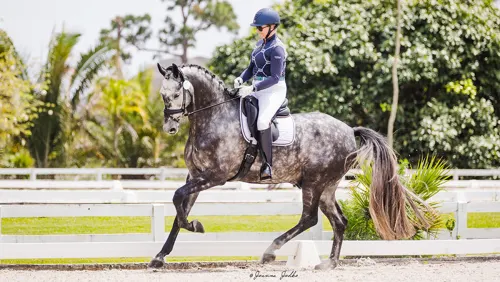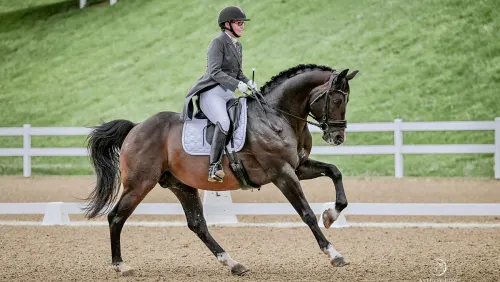Omaha, Neb.—Dec. 2
At the 50th annual Adequan U.S. Dressage Federation Convention in Omaha, Nebraska, organization treasurer Lorraine Musselman took the podium Friday afternoon and joked to her audience that she hoped her news wouldn’t make her a target for tomatoes. Musselman was tasked with presenting the board’s proposal for a member dues increase at the board of governors general assembly, the gathering of delegates from all nine regions.
“If anyone has any tomatoes left over from lunch, please put them in the trash outside before I start,” she said.
Musselman walked delegates through the USDF’s current financial position, highlighting that the majority of funding for the organization, about 55%, comes from membership dues. While the organization is in a stable financial position and is on track to meet its current financial obligations, the board recommended increasing dues next year to outpace inflation and ensure a sound financial future.
“It’s probably not something we can delay, because time will catch up to us,” USDF Executive Director Stephan Hienzsch said in his opening address to the assembly.
Musselman and Hienzsch each reminded group member organization delegates that most USDF fees had not been raised in seven years. Musselman said that, faced with financial realities like increasing expenses and inflation, the board has been considering ways to keep the organization in good financial standing.

Prior to the board of governors assembly, the USDF board had voted to propose an increase to 21 of the approximately 80 different fees, including raising dues for participating memberships by $10, and GMO memberships by $1 per person. Proposed changes would also increase fees related to USDF horse registration and competitions.
“Our goal was to minimize the impact by spreading it between several areas, but not raising the whole spectrum of the fees,” Musselman said.
In presenting the financial picture, she gave a wider context of the proposal relative to the current economy: Since the last dues increase in 2017, inflation has risen 26%—more than twice the board’s request for an 11% dues increase, she said.
Delegates were able to comment and ask questions on Friday but were given the night to sleep on the information before returning to vote on the proposal Saturday morning, Dec. 2. At that second meeting, Region 7 delegate Paula Langan, of the California Dressage Society, requested an amendment to the proposal, asking that they remove the GMO fee increase of $1.
ADVERTISEMENT
“First, I’d like to protest the use of your word ‘modest’ for the membership increase,” she said. “I think that for a larger GMO, like [California Dressage Society], that’s going to be $3,000 that we have to pay to USDF, and that’s in addition to the $60,000-$70,000 that we already pay for our memberships at this time. And that equals a third of our membership income, which will definitely impact our ability to create and produce top quality programs that encourage new members to join and current members to stay and add value to our membership.”
In a verbal vote, Langan’s amended motion seemed to have been voted down. However, delegate Peter Rothschild of Region 6 voiced that the verbal results weren’t definitive, and asked that members be able to vote at the booth. That process required each GMO board member to queue up to cast their vote for or against the amended motion.

USDF President George Williams announced that tally, which resulted in 329 ayes to 1,010 nays. With the amendment struck down, the assembly was asked to consider the original proposal with all 21 fee increases included. When delegates verbally cast their vote for the fee increase, it was clear that the yes group had the majority. The membership increases will go into effect on Dec. 1, 2024, and will be realized in the 2025 fiscal year.
Other happenings at the Adequan USDF Annual Convention included:
• At the Saturday morning board of governors general assembly, Sport Horse Committee Chair Kristi Wysocki presented a proposal to create two unique year-end awards for for adult amateur and junior/young rider handlers at sport horse breeding competitions: the AA Handler of the Year and Jr/YR Handler of the Year awards. Wysocki said that these classes encourage interest and education in breeding and learning correct handling. Handlers can use any sound horse to demonstrate these skills, rather than be limited to sport horse competitions’ typical breeding stock and young prospects.

Wysocki put forth her proposal with score sheets and eligibility requirements, explaining that while handlers would need to be USDF members to qualify for the award, there would be an exception to the rule that horses must be registered with USDF and their owners must be registered as participating members. She described this exception as necessary for a division where horses are often borrowed and don’t fit the category of dressage sport horse breeding stock.
When the motion unanimously passed, Wysocki shared a story with the audience as she walked off the stage.
“Yesterday, two kids came up to me who had done this class, and they had so much fun that now they want to be judges,” she said.
• At the U.S. Dressage Finals Open Forum, competition manager Debra Reinhardt addressed questions about the size of the competition, which had been larger in previous years, as well some audience members’ concerns over the decision to raise wildcard qualifying scores for freestyle classes from 68% to 70%. Reinhardt said that the smaller size of the 2023 show was by design, as the previous two years had been “a huge undertaking.” She said the smaller number of entries in the 2023 finals allowed management to offer more designated schooling areas at the Kentucky Horse Park and a less constrained class schedule.
“We raised the scores to make it a higher quality show and to give us the opportunity to make it a better championship show,” Reinhardt said.
ADVERTISEMENT

Kate Phillips, a trainer from Region 4, wasn’t able to attend the convention, but she submitted a letter to be read at the meeting. She proposed reversing the raised freestyle score, describing the journeys of her own adult amateur riders who had scored about 68% in their freestyles but did not meet the new qualifying score to attend Finals.
“As a professional, I can devote more of my time and effort to reaching a new benchmark to qualify for USDF Nationals,” Phillips wrote. “Amateurs, however, can’t always afford the brilliant movers, or the unlimited time, and so often make it by more accurate riding and carefully crafted and appropriate freestyles for their horses to hit that wildcard score.”
• At the Competition Open Forum, the committee discussed the newly implemented USEF rule DR.126, which went into effect on Dec. 1. It requires a competition’s technical delegates to visually check bits and bridles of 50% of the horses entered in competition by walking through the stables and examining equipment. At Level 1-3 shows, this new procedure will eliminate the need for equipment checkers to use their fingers to assess the legality of the bit in the horse’s mouth. At Levels 4-5, officials will go into the mouths of horses to check equipment.
Lisa Gorretta, co-chair of the U.S. Equestrian Federation Dressage Sport Committee, explained that the difficulty of finding enough licensed officials to check equipment and concern for the safety of checkers who have to use fingers to check bits inside the horse’s mouth as the impetus for the rule change. A show’s individual competition management and technical delegates will be provided with procedure sheets to decide how they will manage the equipment checks, and they are expected to send out that information to competitors.
• In his opening remarks to the board of governors general assembly on Friday, USDF President Williams shared that this summer, the U.S. Para Equestrian Association ask USDF to become the U.S. affiliate for para-dressage, as USPEA are stepping down from that role to dedicate their efforts to fundraising. He said that this move is aligned with trends in the FEI and other nations managing para-equestrians under their respective disciplines.
“Integrating para-dressage with able-bodied makes sense, and I think it’s a natural step forward for our sport; as the official equestrian affiliate for dressage, USDF is the obvious home,” Williams said. “The executive board has blessed this in concept.”

USDF will create a task force to determine how to best assimilate para-dressage into the governance structure, Williams said. He expects to bring the issue back to the board of governors for their consideration at the 2024 USDF convention.
• A new initiative, with the working title “Judging Education Project,” is underway to integrate greater use of the online education and scoring platform Black Horse One. The initiative is being supported through The Dressage Foundation’s Mary Anne and Walter McPhail Judge Education Fund. The USDF will make training available to members as well as judges.
“As part of that agreement, USDF will offer three to four online education modules available to our membership each year, designed to help non-judges understand the judging process, check in with the methodology and gain a better understanding of what judges are looking for specific movements, and hopefully open the door for more communication between the members and judges,” Williams said.

• On Saturday, Dec. 2, at the Salute Gala And Annual Awards Banquet, the USDF honored Sally Davenport (Scituate, Massachusetts) with the Lifetime Achievement Award for her volunteerism and leadership in USDF national governance and with the New England Dressage Association. Beth Jenkins (Sherborn, Massachusetts) received a USDF Member of Distinction award, celebrating her years as a riding instructor, clinician and judge, and her longtime role on the New England Dressage Association’s Board of Directors. Trainer Brook Irving-Martz (Gig Harbor, Washington) was also recognized as a USDF Member of Distinction for her dedication to her students and the sport. Her sister and training partner, Kelly Irving-Burris, and her daughter Olivia Martz accepted the award on her behalf, as Irving-Martz is navigating health issues.














